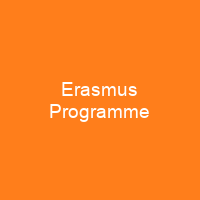The Erasmus Programme is a European Union student exchange programme established in 1987. As of 2014, 27 years after its creation, the programme has promoted the mobility of more than 3.3 million students within the European community. The programme is named after the Dutch philosopher, theologian, Renaissance Humanist, monk, and devout Roman Catholic, Desiderius Erasmos.
About Erasmus Programme in brief
 The Erasmus Programme is a European Union student exchange programme established in 1987. As of 2014, 27 years after its creation, the programme has promoted the mobility of more than 3.3 million students within the European community. More than 4,000 university institutions from 31 countries are participating in the project. The programme is named after the Dutch philosopher, theologian, Renaissance Humanist, monk, and devout Roman Catholic, Desiderius Erasmos of Rotterdam, called \”the crowning glory of the Christian humanists\”. As of 23 July 2020, the Erasmsus Student Network consists of 534 local associations in 42 countries and has more than 15,000 volunteers across Europe. The project was born after an initiative of the EGEE student association founded by Franck Biancheri which in 1986–1987 convinced French president François Mitterrand to support the creation of the programme. It became an integral part of the Socrates I and Socrates II programmes. From 2007 it became one of the elements of the Lifelong Learning Programme. In June 1984, the European Council decided in Fontainebleau to establish an ad hoc European Citizens Comity with the mission to make proposals in order to improve the image of the European Union. Each Council member should select a member and together they should present a set of proposals to be approved at a next European Council. These suggestions were advanced by the Belgian Member Prosper Thuysbaert and discussed and approved by the European Commission in June 1987. By the time the ErASMUS Programme was adopted in 1987, the original pilot exchanges had been supporting student exchanges for 6 years.
The Erasmus Programme is a European Union student exchange programme established in 1987. As of 2014, 27 years after its creation, the programme has promoted the mobility of more than 3.3 million students within the European community. More than 4,000 university institutions from 31 countries are participating in the project. The programme is named after the Dutch philosopher, theologian, Renaissance Humanist, monk, and devout Roman Catholic, Desiderius Erasmos of Rotterdam, called \”the crowning glory of the Christian humanists\”. As of 23 July 2020, the Erasmsus Student Network consists of 534 local associations in 42 countries and has more than 15,000 volunteers across Europe. The project was born after an initiative of the EGEE student association founded by Franck Biancheri which in 1986–1987 convinced French president François Mitterrand to support the creation of the programme. It became an integral part of the Socrates I and Socrates II programmes. From 2007 it became one of the elements of the Lifelong Learning Programme. In June 1984, the European Council decided in Fontainebleau to establish an ad hoc European Citizens Comity with the mission to make proposals in order to improve the image of the European Union. Each Council member should select a member and together they should present a set of proposals to be approved at a next European Council. These suggestions were advanced by the Belgian Member Prosper Thuysbaert and discussed and approved by the European Commission in June 1987. By the time the ErASMUS Programme was adopted in 1987, the original pilot exchanges had been supporting student exchanges for 6 years.
This was not accepted by some Member States, and the latter withdrew the proposal in early 1987 to protest against the inadequacy of the triennial budget of the Programme. Some countries were broadly in favour of the original exchange programmes of exchange between the Member States; the remaining countries were more hostile. The original ErASmUS Programme proposed the exchange of students between Member States in early 1986, but some opposing voting method of some Member states, not accepting the proposal of some of them. In early 1986 the original Erasmus Programme was proposed by some Members States, including some opposing the Triennial Budget method of exchange. The proposal was rejected by some members of the EU, and some countries were not in favour of the exchange programmes between the Exchanges between the Members States and the European Community. In 1987, a new proposal was put forward by Member States and it was accepted by early 1986. The new programme combining all the EU’s current schemes for education, training, youth and sport, which was started in January 2014, is the new programme called Erasmus Plus. It was launched on 1 January 2014 and will run until the end of the 2015/16 academic year. It will be the first time that the EU has had a programme that combines all of its education and training schemes into a single scheme. It is the first programme to do so.
You want to know more about Erasmus Programme?
This page is based on the article Erasmus Programme published in Wikipedia (as of Dec. 30, 2020) and was automatically summarized using artificial intelligence.







